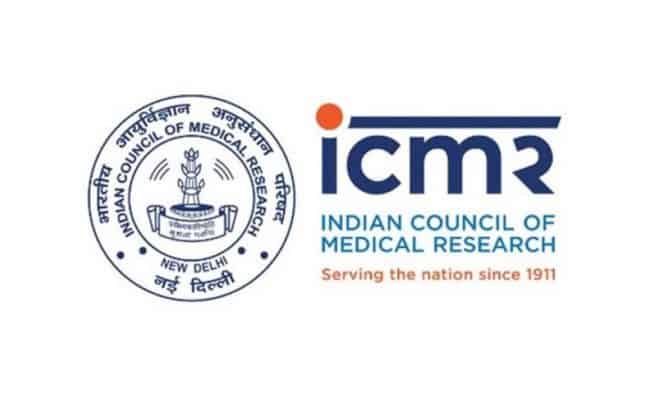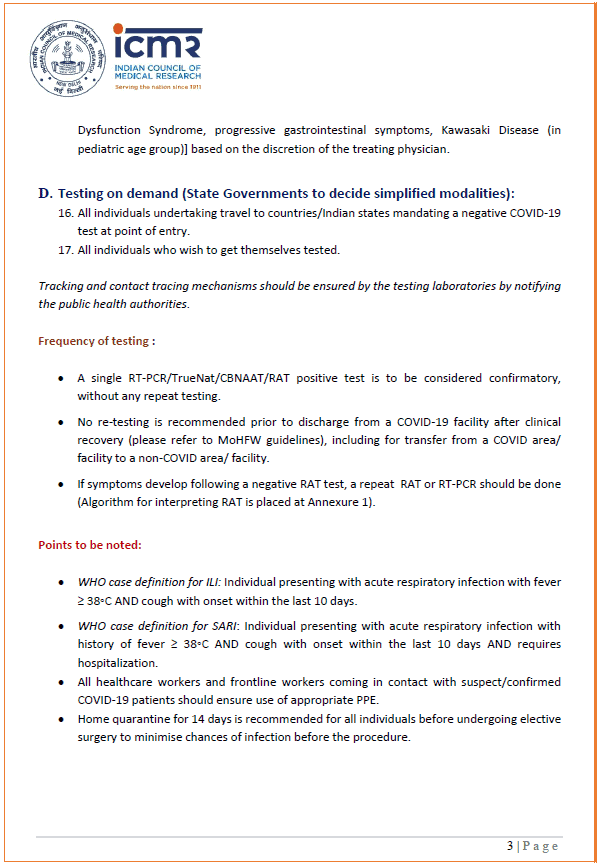With India getting 10 lakh coronavirus cases in 13 days ICMR permits “Testing on Demand”

Last updated on February 15th, 2023 at 12:32 pm
The Indian Council of Medical Research (ICMR) has allowed ‘testing on demand’ under new Covid-19 testing strategy. The guideline has however been left to states for modification on their discretion. ICMR has advised “testing on demand for all individuals undertaking travel to countries or Indian states mandating a negative Covid-19 test at the point of entry.”
On Friday, version VI of “Advisory on Strategy for Covid-19 Testing in India” was issued. The issue also suggested that all people living in containment zones must be tested using rapid antigen tests, specifically in cities with widespread transmission of infection. ICMR also said that no emergency procedure, which includes deliveries, should be delayed for Covid-19 tests. Also, pregnant women must not be referred if there is lack of testing facility. Furthermore, the current guidelines for Covid-19 testing have been elaborated and divided into four parts – “routine surveillance in containment zones and screening at points of entry, routine surveillance in non-containment areas, hospital settings and testing on demand – and choice of test in order of priority has been listed as RT-PCR, TrueNat or CBNAAT and rapid antigen tests.”


Under category “routine surveillance in containment zones and screening at points of entry” the guideline recommends testing all asymptomatic and high-risk people in containment zones, 65 years old and above with co-morbidities. All symptomatic cases must also be tested along with healthcare and frontline workers. Symptomatic individuals who are in direct contact or are high-risk contacts are to be tested once between day 5 to 10 from coming in contact. Choice of test is listed as Rapid Antigen Test (RAT) as number one, followed by RT-PCR, TrueNat or CBNAAT.
Under category “routine surveillance in non-containment areas” the advisory says that all asymptomatic high-risk contacts (family, workplace, over 65 years and those with co-morbidities) must be tested with RAT as first choice of tests. All symptomatic patients with history of international travel in last 14 days, all symptomatic cases of laboratory-confirmed case, all symptomatic healthcare and frontline workers in containment and mitigation activities and all symptomatic cases in returnees and migrants withing 7 days of illness, must be tested with RT-PCR, TrueNat or CBNAAT as first test choice.
Under “hospital settings” category the advisory recommends all patients of Severe Acute Respiratory Infection (SARI), all symptomatic (ILI) patients, asymptomatic high-risk patients who are hospitalized or are seeking hospitalization like immunocompromised, cancer patients, transplant patients, to be tested. Also, all pregnant women in or near labor who are hospitalized for delivery and asymptomatic patients hospitalized for surgery to be tested not more than once a week during hospital stay.
These measures are likely to reduce Covid-19 transmission from mothers to babies. Neonates presenting with acute respiratory or sepsis like illness must be tested. The guidelines also recommend that if symptoms develop after a negative RAT test, a repeat RAT or RT-PCR must be done. Home quarantine of 14 days is recommended for all who undergo elective surgery to reduce chances of infection before the surgical procedure.
Read: Who will lead the Congress as Sonia Gandhi stands ‘unwilling’ to continue as Interim President?



